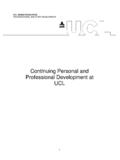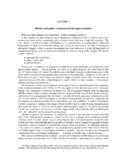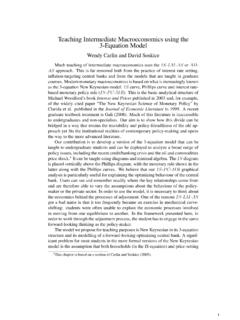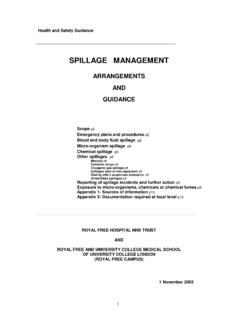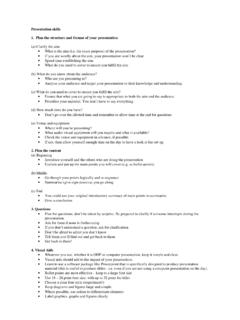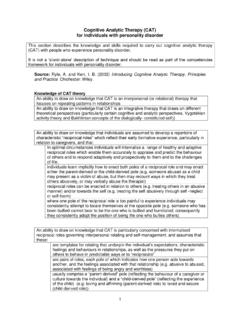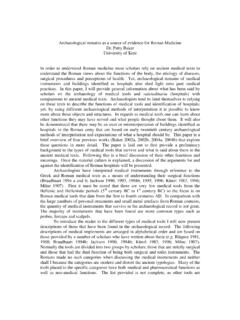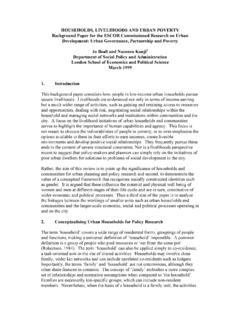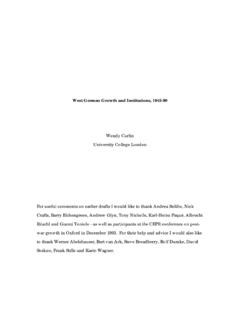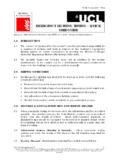Transcription of Improving Access to Psychological Therapies, London ...
1 Improving Access to Psychological Therapies, London Recruitment 2022: Information for Applicants P o s t G r a d u a t e C e r t i f i c a t e i n L o w I n t e n s i t y C o g n i t i v e B e h a v i o u r I n t e r v e n t i o n s P s y c h o l o g i c a l W e l l b e i n g P r a c t i t i o n e r s ( P W P s ) It is essential that applicants read this information along with the job description and person specification in order to make a successful application. This is the IAPT Training Information Pack for applicants wishing to apply for Psychological Wellbeing Practitioner (PWP), training places and jobs. PWPs are also known as Low Intensity (LI) workers and/or Step 2 workers.
2 The information accompanies the job description and person specification. introduction and use information PWP training is anticipated to be run face to face at UCL, with some online learning. Therefore, all applicants should be prepared to be coming into Central London for their training at UCL as well as have the facility to work remotely. All trainees are employed in an IAPT service and will be expected to attend work in the office for at least part of the week as per each individual IAPT service requirements. The above is subject to no further COVID-19 restrictions. Should this change, then the requirement to come into both UCL and into your IAPT service will be reviewed alongside government and NHS guidance.
3 Please find links below to resources that you might find useful to know more about our trainees experiences of the UCL course, and a webinar on becoming a PWP in IAPT: (1) Short clips that previous PWP trainees have made to tell you about their experiences of the UCL course and training in local London services click here and here (2) A webinar that a London service has produced that provides information on what IAPT is, the importance of a diverse workforce, how to apply and become a PWP and a day in the life of a PWP/ myth busting about IAPT and PWP role. HEE Update on Funding for Psychological Professions HEE has implemented a policy change for future eligibility on NHS funding specific Psychological professions training programmes for individuals who wish to undertake more than one NHS-funded training.
4 The planned policy change will mean that from April 2022, those entering other NHS-funded Psychological professions trainings would only become eligible for HEE training funding (incl. Clinical Psychology) two years after the qualifying exam board in the original training. The full statement can be found on the HEE website. Background University College London (UCL) is recruiting PWPs on behalf of services who are looking for trainees to work in their area. Vacancies are advertised and recruitment is undertaken on behalf of services across London . PWPs will attend university one day a week and work in services the remaining four days. For further information about the IAPT programme, please see the NHS England website: Each training place involves being on a full time training contract within a London NHS Improving Access to Psychological Therapies (IAPT) Service for the duration of the one year training.
5 Training course fees on this programme are fully funded by the NHS. In addition, trainees will receive a salary from the London IAPT service where they undertake their 4-day a week placement over the year of the programme. This is likely to be a full time NHS band 4 or equivalent salary, as in previous years. Shortlisted candidates will be informed of the agreed salary on offer of interview. We do not currently accept applications from international students unless they have no restrictions on working and studying in the UK for at least one year from starting the course. The programme is not eligible for student sponsorship as part-time courses cannot be sponsored at UCL. We have also received guidance from UK Visas & Immigration (UKVI) that this programme is not eligible under the Graduate Route visa scheme.
6 Candidates are asked to indicate on their application form, at the top of the personal statement, two preferences for the service/employer they wish to work for. There is no guarantee that successful candidates will get their preference. Candidates who do not indicate a preference will simply be allocated to a site at random. There is further information set out below about the correct way to indicate your preference. Please note that services and employers participating in IAPT recruitment in London may change without notice. Please also note that London reserves the right to adjust the location of trainee positions based on the needs of the programme. Terms and Conditions will vary dependent on which organisation is your employer.
7 A list of the participating employers/services can be found in appendix 4. Interviews unfortunately cannot be rearranged if candidates are unavailable. Interviews are expected to occur from early July 2022 for about a two week period. These intakes will start in October 2022. Applicants are not able to choose when their cohort starts and successful candidates must be available to start the course at the allocated time. Training and Jobs Higher Education Institutes (HEI) have been selected to provide the training. These HEI s have been selected based on their ability to demonstrate the capacity, knowledge and expertise to deliver the curriculum that has been developed for each training course.
8 UCL will offer training courses for PWPs. We believe a diverse workforce is essential for meeting the needs of London s communities. We actively promote a culture of inclusion and seek applicants from across communities and age groups. Who Should Apply? Applicants are required to show: Evidence of ability to study successfully at postgraduate level. This can be demonstrated by a good degree at undergraduate level, or by an equivalent academic qualification (for example a Diploma). Substantial work experience and achievements at work can also be taken into account. Evidence of experience in an employed or formal volunteer helping role with people with Psychological , interpersonal or social problems Evidence that they have a broad understanding of mental health issues and the skills to form a good helping relationship with people with mental health problems.
9 This can be obtained through study, work or volunteer experience with people who have experienced a mental health problem. Please note that flexible working hours may be required to deliver accessible service hours and may include working over weekends and evenings. It is envisaged that IAPT trainee posts will be employed on a full-time hours per week basis in the first year of training. Part-time, job share or other flexible arrangements may be considered after this time if the role is offered on a permanent basis. Please see the Job Descriptions and Person Specification for further information. Applying for a Post Recruitment opens at 10am on Thursday 5th May and closes at 5pm on Monday 16th May.
10 The programme application page is as follows: You will need to create an account on the UCL Portico website. Once you have created an account, you will be taken to the application form for the course. All fields marked in pink MUST be completed in order for you to complete that section of the application form. Personal: You will have completed this when you created your account. You can review and amend any details after you have created your account. Address: Please complete this section as directed on the application form. Education: The system will ask you to upload a transcript for both undergraduate and postgraduate qualifications: you MUST upload a document in order to proceed.
